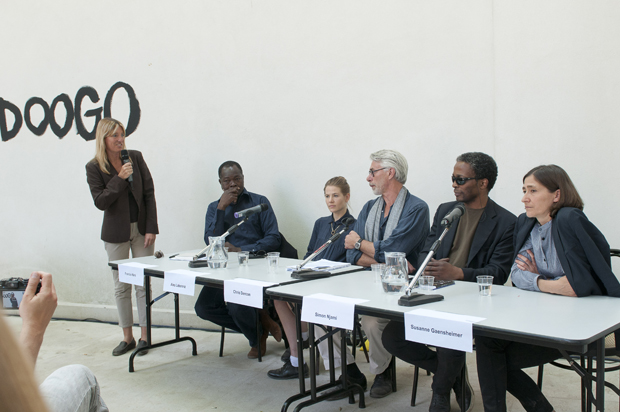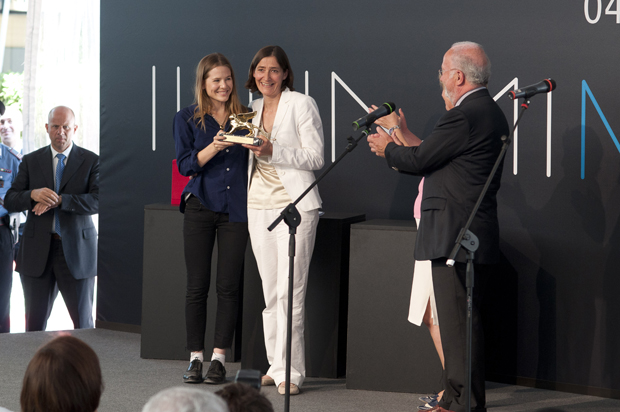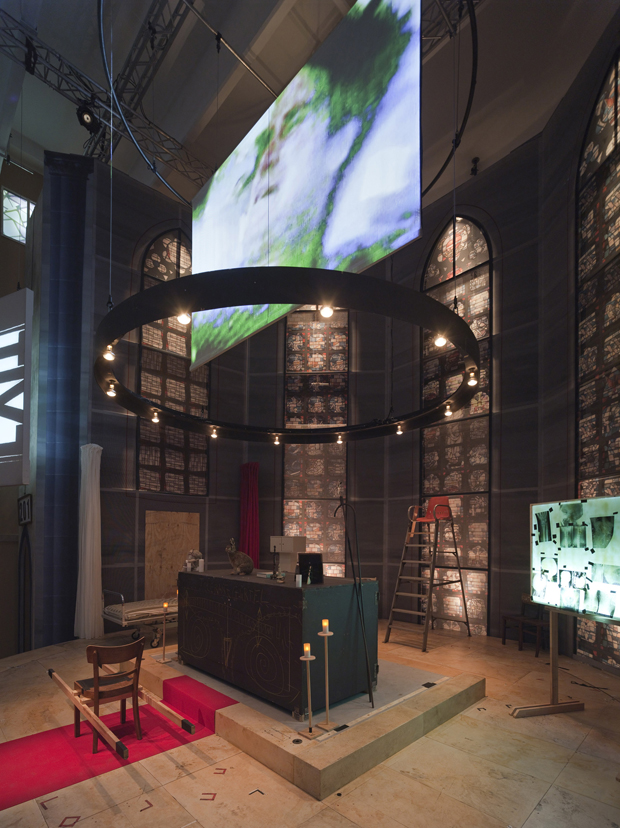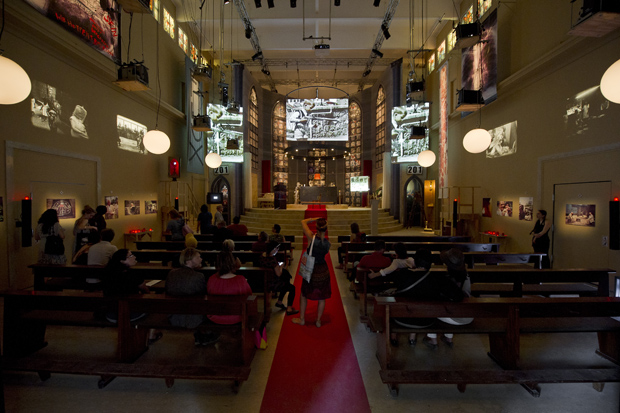
Conversation at the German Pavilion, 2 June 2011, Photo: (c) Roman Mensing, artdoc.de

from left to right Aino Laberenz, Dr. Susanne Gaensheimer and Giorgio Orsoni, Photo: (c) Roman Mensing, artdoc.de

A Church of Fear vs. the Alien Within. Stage installation of Schlingensief`s Fluxus Oratory in the German Pavilion, Altar view with film projection. Photo: (c) Roman Mensing, artdoc.de

A Church of Fear vs. the Alien Within. Stage installation of the Fluxus-oratorio by Christoph Schlingensief in the German Pavilion, Altar view with film projection
Photo: (c) Roman Mensing, artdoc.de
Audio: Funeral
Terror 2000 (Intensive Station Germany), Germany, 1991-92, Directed by Christoph Schlingensief © Filmgalerie 451
Audio: At Table
100 Years Adolf Hitler (The Last Hour in the Fuhrerbunker), Germany, 1988-89, Directed by Christoph Schlingensief © Filmgalerie 451
Audio: The birth of Peter Panne
United Trash, Germany 1995-6, directed by Christoph Schlingensief © Filmgalerie 451
Audio: Theme Music (Helge Schneider)
Menu Total, Germany, 1985-86, Directed by Christoph Schlingensief © Filmgalerie 451
Audio: Border Control
The German Chainsaw Massacre (The First Hour of German Reunification), Germany, 1990, Directed by Christoph Schlingensief © Filmgalerie 451
Christoph Schlingensief pursued his idea of an opera village in Burkina Faso passionately. He imagined it as a “social sculpture,” a place of encounters and of dialogue. The Goethe-Institut supported Schlingensief in this project from the very beginning and continues to be committed to its development. In March, it began the “Conversations” series in Ouagadougou: workshops and discussions both in Africa and in Europe intended to support the realization of the opera village by providing creative stimuli and promoting inner-African dialogue. Now, on 2 June the second meeting will be held at the German Pavilion. Planned participants include Aino Laberenz, Susanne Gaensheimer, Francis Kéré, Chris Dercon and Simon Njami.
“The great power, however, rests in uncertainty, in the conviction that there are no solutions but only transformations and changes of form … that, to me, is not fatalism, it is a very big yes to life.” (Christoph Schlingensief)
Sunday, August 22, 2010, eight o’clock. Stunned by the news of your death that came yesterday—in the end, it was a surprise after all—and having slept only a few hours, I gaze into the morning sun, little big Scorpio brother, and find no way forward in my gloom. As though paralyzed, my mind keeps returning to something Bazon Brock made us take to heart: Death must be abolished, this damn mess must stop. Your fiftieth birthday was to be in a few weeks, the opera village project in Africa needed ongoing work, and of course you had hoped to make a personal appearance in Venice next year, where you were to design the German biennial pavilion. It would have been an honor for you to represent the nation and to irritate it as well, to challenge and provoke. more…
By 1984 I had grown tired of meeting market deadlines in my writing about movies. No launching date? No text! So it was welcome news that the people at Hamburg’s Abaton theater had put together a series of Unknown films by unknown young German directors. I went, curious to see a movie, any movie, without the constraint of having to deliver a review. Tunguska—Die Kisten sind da [Tunguska—The Boxes Have Arrived], by a guy whose name I would learn over time to pronounce without stumbling. Schlingensief. more…
June 23, 2010
To be honest, i don’t get what that lead architect there is saying? It strikes me as a canard. Nazis and communists have one thing in common, they always have to annihilate something to make room for themselves. They’ll rebuild the palace of the republic, too, in a few years, and some day they’ll build that disney imbecility the city palace as well, and then there will be an ordinance some day that we citizens of the federal republic have to run around in historic costumes. There is no limit to the architectonic imbecility in germany. more…
Site survey for the opera village. Ouagadougou. © Bianka Schulze